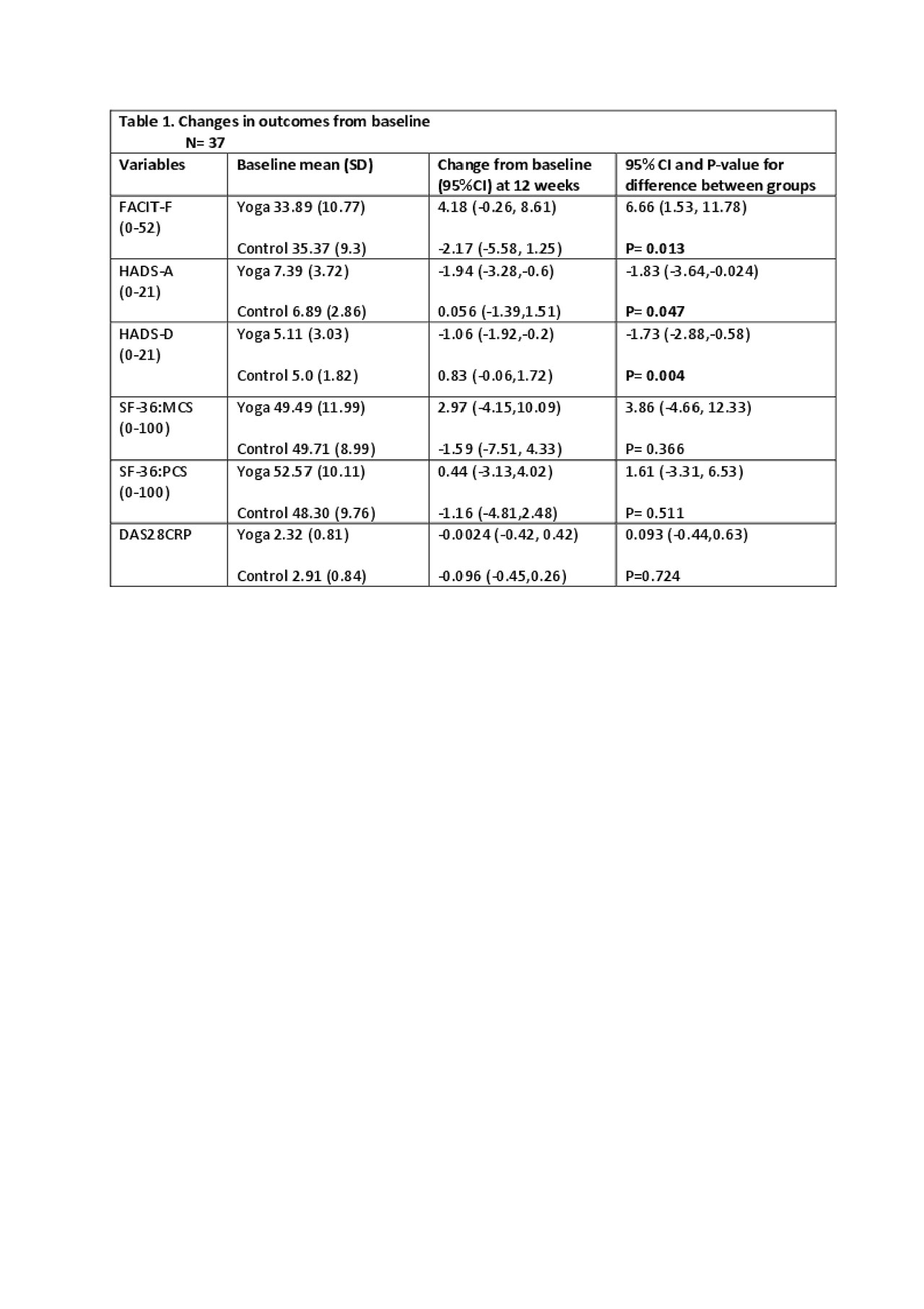Session Information
Session Type: Poster Session (Tuesday)
Session Time: 9:00AM-11:00AM
Background/Purpose: Rheumatoid arthritis (RA) patients perceive reduced health-related quality of life (HRQOL) through functional disability, pain, increased fatigue and impaired psychological functioning. Previous trials demonstrated that Yoga, a mind-body therapy, can enhance both physical and mental health in various chronic conditions including RA. The primary objective of the study was to explore the efficacy of yoga program in improving HRQOL. Secondary objectives included improvement in fatigue, anxiety, depression and disease activity.
Methods: 43 RA patients (2010 ACR/EULAR criteria), ≥ 18 years, stable on standard pharmacological treatment with disease activity according to DAS28CRP < 5.1 were randomly assigned to 12 weeks yoga intervention (2x/week 90 min; n=22) or arthritis-education control (1x/week 60 min; n=21). Yoga intervention according to „Yoga in daily life system“ included asanas, relaxation, pranayama and meditation. Control group had educational lectures on arthritis-related topics delivered by rheumatologist followed by group discussion. Participants completed study evaluations at baseline and post-intervention. Evaluations included The Short Form-36 (SF-36) scores for Physical Component Summary (PCS) and Mental Component Summary (MCS), Functional Assessment of Chronic Illness Therapy-Fatigue (FACIT-F), Hospital Anxiety and Depression scale (HADS) and Disease Activity Score-28CRP (DAS28CRP) questionnaires. Data were analyzed as differences in post and pre-intervention scores. Between group differences were analyzed using the t-test for independent samples. To assess effects of intervention we used per-protocol analysis. P values < 0.05 were considered statistically significant.
Results: Of the 43 patients included 37 ( 18 = intervention group, 19 = control group) completed the trial period. Groups did not significantly differ in baseline characteristics (P >0.05 for all analyses). Mean (SD) age was 55 (10.4) years, median (IQR) disease duration 5 (2.5,8) years, 93 % were female. There was no significant difference found between groups for SF-36 MCS (p=0.366), PCS (p=0.511) and DAS28CRP (p=0.724). Yoga group showed statistically significant improvements compared to control in FACIT-F (p=0.013), HADS anxiety (p=0.047) and HADS depression (p=0.004). Results are shown in the Table. No serious adverse events were observed during trial period.
Conclusion: Although Yoga was not associated with change in SF-36 scores and disease activity it led to significant improvement in fatigue, depression and anxiety which are principal contributors to decreased life quality of RA patients. Our findings are limited by small sample sizes and lack of statistical power to obtain significance for some of presented analyses. Despite limitations, our results suggest that yoga may be of benefit in management of RA patients as supplementary non-pharmacological treatment.
To cite this abstract in AMA style:
Pukšić S, Mitrović J, Čulo M, Živković M, Orehovec B, Bobek D, Lucijanić M, Morović-Vergles J. Yoga Improves Fatigue and Mental Health in Rheumatoid Arthritis: Preliminary Results of a Randomized Controlled Trial [abstract]. Arthritis Rheumatol. 2019; 71 (suppl 10). https://acrabstracts.org/abstract/yoga-improves-fatigue-and-mental-health-in-rheumatoid-arthritis-preliminary-results-of-a-randomized-controlled-trial/. Accessed .« Back to 2019 ACR/ARP Annual Meeting
ACR Meeting Abstracts - https://acrabstracts.org/abstract/yoga-improves-fatigue-and-mental-health-in-rheumatoid-arthritis-preliminary-results-of-a-randomized-controlled-trial/

